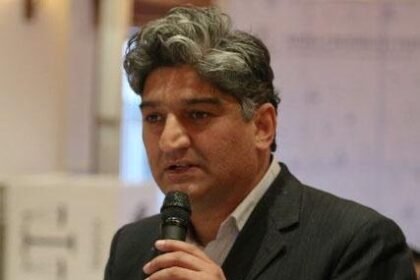In a dramatic development, South Korean President Yoon Suk-yeol was arrested on Wednesday after an unsuccessful attempt to impose martial law in the country, marking a historic first as the sitting president is detained on charges of treason. The arrest follows a series of weeks-long investigations into allegations of corruption and abuse of power, culminating in a raid on the president’s residence by hundreds of investigators and police officers.
According to AFP, Yoon Suk-yeol, who had been accused of attempting to impose a short-lived martial law last month, became the first sitting president in the country’s history to be arrested. The investigation, led by the Corruption Investigation Office, saw law enforcement officers carry out a surprise raid early on Wednesday morning, with some climbing over walls and using back trails to reach the main building of the presidential residence.
The move to apprehend Yoon was the second attempt, following a failed attempt earlier in January. On January 3, investigators had attempted to execute an arrest warrant, but faced resistance from the president’s security services, who engaged in a tense standoff with officers for several hours, blocking them from executing the warrant.
However, Yoon’s legal team announced that the president had voluntarily agreed to cooperate with investigators, signaling his willingness to avoid any escalation by leaving his residence. His lawyer, Seok Dong-hyun, stated on Facebook that Yoon had made the decision to personally appear before the Corruption Investigation Office. Shortly afterward, investigators confirmed that Yoon had been taken into custody.
The Joint Investigation Headquarters issued a statement revealing that an arrest warrant was officially executed at 10:33 AM on January 15. Meanwhile, AFP reporters on the scene reported clashes at the gate of the presidential residence, where pro-Yoon supporters had gathered to protect him. Legislators from Yoon’s ruling People Power Party also arrived to defend him, with many chanting slogans against the “illegal warrant” while waving South Korean and U.S. flags. Some even laid down in front of the residence’s main gate in protest.
Local media outlets reported that, in light of the tense situation, police had decided to wear bulletproof vests and refrain from carrying firearms for the latest operation. After the arrest, Yoon could be held for up to 48 hours under the current warrant, although investigators may need to seek a new arrest warrant if they wish to extend his detention.
Yoon’s legal team has repeatedly described the arrest warrant as unlawful, claiming that it lacked proper legal grounds. The arrest came as a part of a broader investigation into corruption and alleged misconduct by the president. In a parallel development, impeachment proceedings against Yoon were initiated on Tuesday with a brief hearing, despite his absence, which his legal team claimed was due to alleged safety concerns. However, the impeachment process will proceed without his participation, with the next hearing scheduled for later this week.
This tumultuous political crisis stems from Yoon’s attempt to impose martial law last month following mounting political tension between the executive and opposition. The president declared a state of emergency and announced plans to implement martial law, accusing opposition groups of engaging in anti-state activities. His decision was met with widespread condemnation, as political leaders and citizens alike argued that such a move was unconstitutional and unjustified.
In a televised address, Yoon stated that his actions were necessary to “rebuild a free and democratic nation” and protect the country’s constitution. He argued that, with opposition-controlled legislature obstructing his government’s agenda, he had no choice but to act decisively to safeguard the nation’s interests. He claimed that North Korea’s growing threat, along with internal elements seeking to undermine the state, required an immediate and strong response.
Despite his reasoning, the announcement of martial law was swiftly challenged in the National Assembly, where lawmakers passed a resolution rejecting the president’s declaration. The motion, supported by 190 members of parliament, nullified Yoon’s martial law order, forcing the military forces involved to withdraw.
Yoon’s political turmoil deepened as South Korea’s ruling conservative government faced off against the opposition-led National Assembly. Tensions have been high since Yoon assumed office in 2022, with the president struggling to advance his legislative agenda in the face of an opposition majority in the legislature. The opposition’s rejection of his policies has increasingly become a flashpoint for political strife, with accusations of undermining the democratic process.
The failed martial law attempt not only intensified the political gridlock but also raised questions about Yoon’s leadership and the stability of South Korea’s democratic institutions. Many political observers noted that the president’s actions were seen as an authoritarian overreach, undermining the principle of democratic governance and drawing parallels to past autocratic regimes in the country.
Yoon’s political crisis has now moved into a phase of legal and constitutional battles, with the potential for a prolonged standoff between the executive and legislative branches. If the impeachment process continues to gain traction, it could result in the first presidential impeachment in South Korea’s modern history.
The situation has drawn international attention, with analysts noting the significant implications for South Korea’s political future and its relationship with other nations, particularly the United States and neighboring North Korea. As Yoon’s legal team contests the arrest, the country’s political future remains uncertain, and it remains to be seen whether the president can weather the storm of legal and political challenges that lie ahead.
In conclusion, South Korea stands at a crossroads, facing a political crisis that could reshape the nation’s leadership and governance for years to come. As investigations continue, the implications of Yoon’s arrest and the broader political upheaval remain unclear. The unfolding drama is set to dominate national discourse, and the coming days will likely determine whether South Korea’s democratic institutions can withstand the pressure or if the country will be thrust into deeper political instability.





